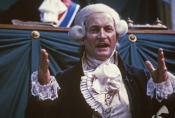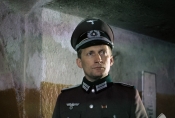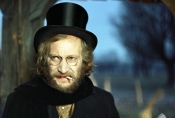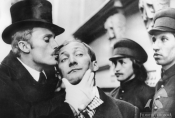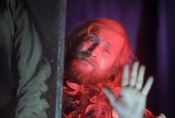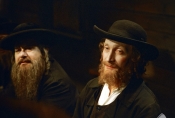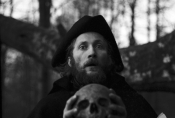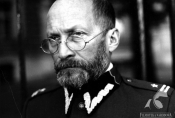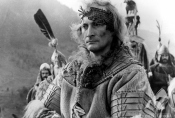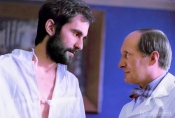Wojciech Pszoniak
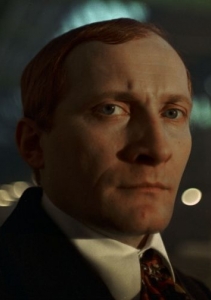
“Acting for me is what pen and ink wouldbe if I was a poet, or a brush, if I was a painter. It is my means to cope with the world and people. I'm not an actor from nine to five. At the moment, I am not playing any role, but I'm an actor. It's a way of processing reality, a kind of communication,” the actor said in an interview for “Gazeta Wyborcza” (2008).
He was born on May 2, 1942 in Lviv. He is a graduate of the Acting Department of the State Higher School of Theatre in Krakow (1968). After graduation, he joined the Krakow's Stary Theatre (1968-1972) and then worked for Warsaw theaters: Narodowy (1972-1974) and Powszechny (1974-1980). Since 1978, he has been performing on many French stages. Winner of many prestigious awards, including the Leon Schiller Award (1972) and the Aleksander Zelwerowicz Award (2001). In 2012, along with Daniel Olbrychski and Andrzej Seweryn, he recived the Lifetime Achievement Award, with particular emphasis on their outstanding performances in Ziemia obiecana/The Promised Land, at the 26th edition of the Tarnow Film Awards Ceremony.
He first appeared on screen as the father of a boy imprisoned in a Nazi concentration camp in the hauntong Twarz anioła/Face of an Angel (1970) by Zbigniew Chmielewski. The following year, he starred as Yeshua in Andrzej Wajda's German TV film Pilate and Others (1971), inspired by Master and Margarita by Mikhail Bulgakov, and then he played the double role – the Journalist and Stańczyk – in Wajda’s adaptation of Wesele/The Wedding (1972) by Wyspiański. Two years later, the director cast him in the role of Moryc Welt in Ziemia obiecana/The Promised Land (1974), a spectacular film adaptation of Reymont’s novel, describing the lives of three friends, who earn a fortune in the nineteenth century Łódź. “There are three heroes: one is a Pole (Daniel Olbrychski), the second one – German (Andrzej Seweryn), and the third one is a Jew (Wojciech Pszoniak). Their do not let those differences in their background stand between them. Together, they set up a factory. They share a common interest, a shared sense of class identity,” says Wajda. Ever since that film, the trio of actors began have been called “the three musketeers of Polish cinema.”
Pszoniak had two more great performances Wajda's films: Maximilien de Robespierre in Danton (1982), based on the drama by Stanisława Przybyszewska, depicting the conflict between two leaders of the French Revolution – Danton and Robespierre (Danton’s naivety and idealism is juxtaposed to Robespierre's ruthless politics of terror become a clear metaphor for the situation of Poland under martial law), and the title character in Korczak (1990), the great physician and scholar managing an orphanage for Jewish children who, during the liquidation of the ghetto, refused to go into hiding on the Aryan side and stayed with the children until the end.
Pszoniak played many interesting – and very diverse – roles in costume dramas, including the title character of Diabeł/Devil (1972, premiered in 1988) by Andrzej Żuławski, an expressive vision of Poland at the time of partitions in 1793, Duke Mieszko 1st in Gniazdo [The nest] (1974) by Jan Rybkowski, or Ginger Yosele in Austeria (1982), a beautiful adaptation of the novel by Julian Stryjkowski. He is a highy versatile, universal actor, perfectly at ease with both historial and contemporary material, as evidenced by: his role Ryszard Bielczyk, a thirty-something man who tries to help his elder brother, afflicted with an incurable disease in Skazany [The condemned] (1975) by Andrzej Trzos-Rastawiecki, Stefan Garbarek, former officer of the Security Service, in Kret/Mole (2010), by Rafał Lewandowski, or the First Secretary of the Polish United Workers' Party, comrade Władysław Gomulka in the film by Antoni Krauze, dedicated to the tragic events of December 1970 – Czarny czwartek/Black Thursday (2011).
“I do not consider myself a ‘professional actor.’ A professional is what a pilot, a surgeon, or a bridge-builder has to be. A poet, a priest – it is not a profession, it's something more. The artist should be trained but it does not suffice. There is a number of other, imperceptible things, that are important. For example, one’s attitude to values. Involvement in mediocre productions, lacking any ambition, such as stupid television sitcoms, does not go unpunished. It leaves a mark. The art of acting is also the courage to take care of one’s own moral, mental, and emotional condition. When I feel that I act in theatre too much and I start to wear out – I take a break. I move on to do something else for a while. I read, travel, invent recipes, and listen to music. I do the thing I need to be not only a craftsman, but above all a self-aware, complete human being. Otherwise I would not be an actor, but a 'product' or a manufacturer of ‘products.’ At least this is how I understand the ethos of acting,” Pszoniak confessed in an interview in “Gazeta Wyborcza” (2012).
Selected filmography
-
1972
THE WEDDING
reż. Andrzej Wajda
-
1974
THE PROMISED LAND
reż. Andrzej Wajda
-
1978
HOSPITAL OF TRANSFIGURATION
reż. Edward Żebrowski
-
1979
ARIA FOR AN ATHLETE
reż. Filip Bajon
-
1982
THE INN
reż. Jerzy Kawalerowicz
